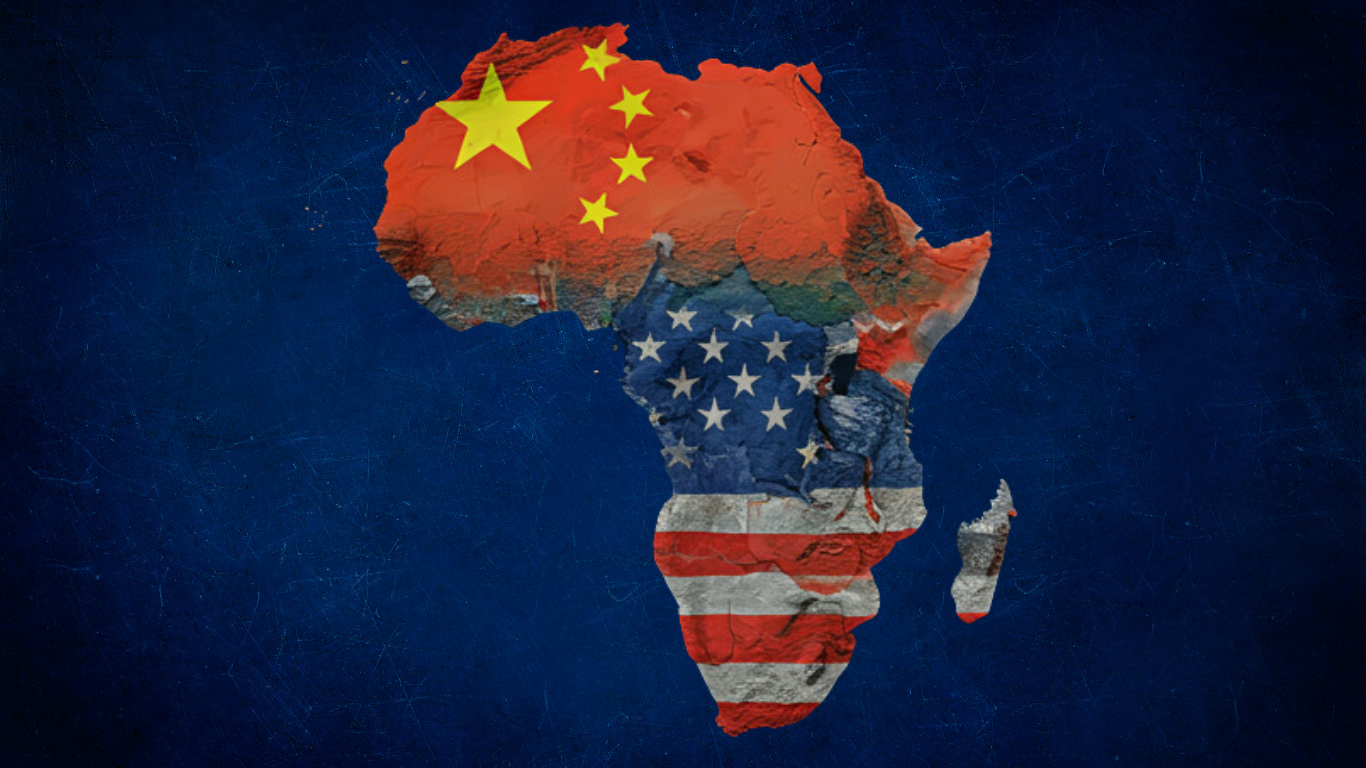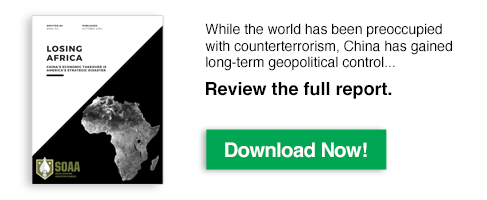As Washington indulges in bureaucratic inertia, focusing disproportionately on counterterrorism and short-term aid programs, China is executing a global coup right under America’s nose—starting with Africa. While U.S. policymakers fixate on hunting terrorists in the Sahara, China has already secured the continent’s future, locking down critical infrastructure, resources, and political influence through its Belt and Road Initiative (BRI). China is quietly laying the foundation for the next century, building the roads, railways, and ports that will shape Africa’s future—and with it, the global balance of power. Meanwhile, the U.S. remains locked in an endless conflict against militants in the desert. It’s a strategic blunder of catastrophic proportions, one that will haunt America for decades.
China’s economic imperialism in Africa is the real national security threat, and the U.S. is losing ground daily. If Washington continues to focus solely on terrorism, neglecting the strategic implications of China’s deepening economic influence, the United States will soon find itself irrelevant in one of the most geopolitically significant regions of the 21st century. And here’s the uncomfortable truth: it’s not just neglect; it’s arrogance. American hubris is blinding the U.S. to the long game being played by Beijing, and Africa is slipping away.
The Real Threat: China, Not Terrorism
For the past two decades, U.S. policy toward Africa has been dominated by a single obsession: terrorism. Since the creation of U.S. Africa Command (AFRICOM) in 2007, Washington has been laser-focused on dismantling terrorist groups like al-Shabaab in Somalia and Boko Haram in Nigeria. Despite years of military intervention, these groups remain entrenched. While the U.S. has been fixated on counterterrorism operations, China has been quietly securing the continent’s future through economic infrastructure projects.
Take Djibouti, for example—a country of profound strategic importance due to its location at the mouth of the Red Sea, a critical global trade route. The U.S. established Camp Lemonnier, a key military base for counterterrorism operations, but while the U.S. focused on militants, China built the Djibouti International Free Trade Zone and its first overseas military base just miles away. In one swift move, China not only secured a strategic maritime hub but also gained the capability to monitor and potentially disrupt U.S. naval operations. The U.S. may have focused on fighting extremists, but China was securing the future of African trade routes and geopolitical dominance.
This is the stark contrast: across Africa, China’s infrastructure investments are securing long-term control over key assets, placing it in a position to influence trade routes, resource allocation, and political decisions. As the U.S. remains preoccupied with militant cells, China is shaping the continent’s future. By controlling the very infrastructure that drives economic development, China is embedding itself in Africa’s political systems and securing its geopolitical leverage for generations.
Economic Control is National Security
The greatest threat to U.S. national security in Africa is not terrorism; it’s the long-term strategic control China is exerting over the continent’s economies and resources. China’s infrastructure projects are not merely economic initiatives—they are Trojan horses for geopolitical control. By financing and building Africa’s infrastructure, China is creating a network of economic dependencies that will allow it to dictate the political and economic future of the continent.
Kenya provides a telling example of this. In 2017, Kenya sought Chinese financing for the Mombasa-Nairobi Standard Gauge Railway, a $4.7 billion project that was heralded as a game-changer for the nation’s economy. However, when Kenya struggled to repay its loans, rumors swirled that it might be forced to cede control of the Port of Mombasa—the most important trade gateway in East Africa—to Chinese authorities. Although this scenario was narrowly avoided, it highlights the risk: China’s loans come with strings attached, and when African nations cannot pay, China gets to dictate the terms.
China’s dominance in the Democratic Republic of Congo’s cobalt mining industry—controlling 70% of global production—poses a direct challenge to U.S. interests. As the world shifts toward renewable energy technologies, the U.S. risks becoming dependent on a resource controlled by a strategic competitor. This is not merely an economic concern but a fundamental national security issue. Access to cobalt is crucial for the production of batteries and electric vehicles, technologies that are pivotal to both the green energy revolution and the future of U.S. technological leadership. By controlling the supply chain, China is securing an outsized influence over industries critical to the 21st-century economy.
These are not isolated incidents. Across Africa, China’s infrastructure projects are enabling it to wield unprecedented economic and political influence. By controlling the ports, railways, and telecom networks that drive African economies, China is securing leverage that will allow it to control the continent’s political destiny. And the U.S., by focusing narrowly on counterterrorism, is allowing this to happen.
American Hubris: The Failure to Compete
Why is the U.S. failing in Africa? The answer lies in a deep-seated hubris that has guided American foreign policy for decades. The U.S. seems to believe that its military and financial dominance are enough to secure its influence, and as a result, it has created the perception that Africa is just a battlefield for counterterrorism and a recipient of foreign aid. This paternalistic approach, however, has done little to win hearts and minds, let alone secure long-term strategic partnerships.
In contrast, China offers African nations what they truly need: economic development. The BRI has poured over $300 billion into African infrastructure projects since 2013, funding everything from roads and bridges to telecommunications networks. One of the clearest examples of China’s growing dominance is its involvement in building Africa’s 5G networks. Chinese telecom giant Huawei has secured contracts across the continent, putting China in control of Africa’s digital infrastructure. With Huawei controlling the flow of information, China is not just building infrastructure—it’s building influence.
Meanwhile, U.S. efforts like Prosper Africa, launched in 2018 to boost trade and investment, have been woefully inadequate. Underfunded and under-publicized, Prosper Africa pales in comparison to the sheer scale of China’s BRI. While Beijing is reshaping Africa’s economic landscape, Washington continues to see the continent through the narrow lens of counterterrorism and foreign aid. The result? African nations increasingly see China, not the U.S., as their most important partner.
Even worse, the U.S. lectures African governments on democracy and human rights while failing to offer the one thing they desperately want—economic development. China, on the other hand, delivers without the moralistic lectures. Beijing’s “no strings attached” model of investment is more appealing to African leaders than Washington’s conditional aid. As a result, African nations are increasingly aligning with China in international forums like the United Nations, voting in line with Beijing’s interests. The U.S. is losing not just on the ground but also in the corridors of global power.
Economic Warfare: The Real Battlefield
It’s time to recognize that Africa is not solely defined by its security challenges. The real battlefield in Africa is economic, and China is winning. Control over Africa’s infrastructure and resources will determine who controls the future of the global economy, and the U.S. is losing this fight. China’s investments in Africa are not acts of charity—they are strategic moves designed to lock African nations into long-term dependencies that serve Beijing’s interests.
This is particularly evident in China’s growing control over Africa’s natural resources. The DRC, home to vast deposits of cobalt, is at the center of the green energy revolution. As the world shifts toward electric vehicles and renewable energy technologies, cobalt will become one of the most valuable resources on the planet. By securing control over the DRC’s mining industry, China has positioned itself as the gatekeeper to the global supply chain for cobalt. The U.S., meanwhile, has largely ignored this critical resource, leaving itself vulnerable to future shortages.
If the U.S. continues to focus solely on counterterrorism while ignoring the economic war being waged in Africa, it will find itself shut out of one of the most resource-rich and strategically important regions in the world.
A New Strategy: Economic Engagement as National Security
To counter China’s growing influence in Africa, the U.S. must overhaul its approach to the continent. The first step is recognizing that economic engagement is a national security priority. The U.S. cannot continue to treat Africa as a secondary theater of operations; it must prioritize economic partnerships and investment.
This means significantly expanding programs like the Millennium Challenge Corporation (MCC) and Prosper Africa, ensuring they have the resources and scale to compete with China’s BRI. At the same time, Congress must keep MCC spending and programmatic content accountable to address waste or programs outside the strict mandate of development. It also means encouraging U.S. companies to invest in African markets, particularly in sectors like telecommunications, energy, and transportation. The U.S. must offer African nations real alternatives to Chinese investment, or it risks losing influence altogether.
At the same time, the U.S. military presence in Africa needs a reorientation. Special Operations Forces (SOF), long deployed for counterterrorism missions, should be redeployed to assist African nations in protecting their critical infrastructure. Instead of focusing solely on eliminating militants, SOF, in concert with the U.S. Embassy team, should work alongside local forces to secure ports, railways, and telecommunications networks from external coercion.
Conclusion: America’s Last Chance
The U.S. is running out of time to counter China’s growing influence in Africa. The longer Washington ignores Beijing’s economic takeover, the harder it will be to regain lost ground. The global competition between the U.S. and China will not be decided by drone strikes or military bases—it will be decided by who controls the future of the world’s economies. And Africa is central to that future.
If Washington continues down its current path, treating Africa as a sideshow in the fight against terrorism, it will lose not just Africa, but its position as a global leader. The U.S. must stop relying on outdated notions of military and moral superiority and start competing where it really matters—on the economic battlefield. China has already begun, and the U.S. is dangerously behind.
The U.S. can still turn the tide, but only if it acts now. Economic engagement must be prioritized, and the tools of military power must be repurposed to protect economic interests. Africa is not a counterterrorism battleground—it is the future of global power. And the U.S. cannot afford to lose.
By Amal Ali
Amal Ali, one of the esteemed members of our Board of Advisors, is the CEO and Founder of Elysium Strategy Group, a Washington D.C.-based Commercial Diplomacy firm, specializing in strategic market expansion in national security-relevant sectors across Africa. And the Co-Founder and Chief Strategy Officer at Valens Games, which partners with major Silicon Valley tech companies and SOF on innovative AI wargaming. Amal brings over 13 years in national security, with prior active duty service in the U.S. Air Force serving at the National Security Agency. Her professional experience and subject matter expertise integrate U.S. trade and national security interests across the globe. A naturalized U.S. citizen and combat veteran, Amal is based in Northern VA.






